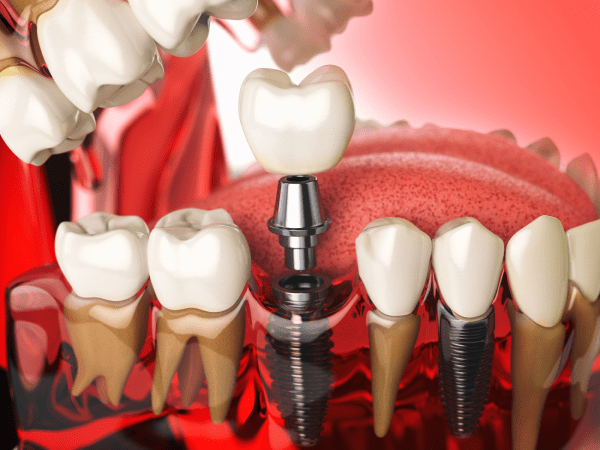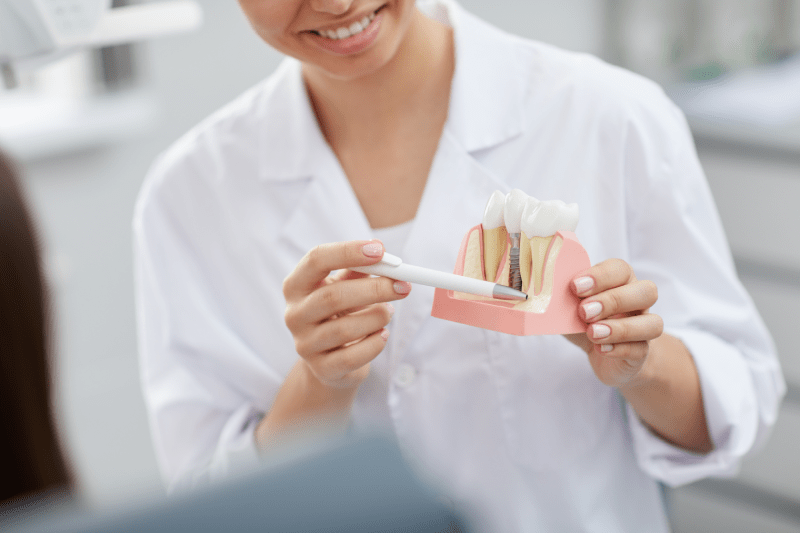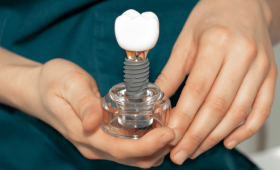What is a Dental Implant?
A dental implant is an artificial tooth root made of titanium or zirconium, which is placed into the jawbone to replace missing teeth. This root biologically integrates with the jawbone over time, creating a solid foundation for a porcelain crown, bridge, or prosthesis. Implants make it possible to replace even a single tooth without harming adjacent healthy teeth. By offering natural chewing function and an aesthetic appearance, they significantly improve the patient’s quality of life and provide a long-term solution.
Who Can Get a Dental Implant?
In general, any individual with good oral and dental health, whose jawbone has sufficient density and volume to support the implant, can be an implant candidate. However, suitability for this procedure depends on factors such as the patient’s overall health, bone quality, and the condition of the area where the implant will be placed. In some cases, such as in patients with severe uncontrolled diabetes, serious heart diseases, or those undergoing chemotherapy, the risks may increase. Therefore, suitability is evaluated based on a detailed examination and radiological imaging performed by an implant specialist.
How Long Does the Implant Treatment Take?
The duration of implant treatment varies according to the procedure and the patient’s individual situation. After the implant is placed in the jawbone, a period of 2 to 6 months is generally awaited for the implant to fuse with the bone (osseointegration). Once this process is complete, the prosthesis or crown is made. If there is insufficient bone and a bone graft (powder) application is required, these extra times are included in the treatment. Therefore, the total treatment process can extend from 3 months to one year.
Is Implant Treatment Painful?
Since dental implant treatment is generally performed under local anesthesia, the patient does not feel any pain during the procedure. After the procedure, mild pain and swelling are normal. This condition can be easily controlled with painkillers prescribed by the dentist. Most patients describe the discomfort they experience as less bothersome than a tooth extraction. Applying a cold compress for the first few days after the surgery helps reduce swelling and discomfort.
What is the Lifespan of Implants?
Implants can last a lifetime with proper oral hygiene and regular dental check-ups. The most significant factors influencing the success of an implant are the patient not smoking, regular and correct tooth brushing, flossing, and periodic visits to the dentist. Maintaining the health of the bone and gum around the implant is vital for the implant’s longevity. With high success rates, implants are one of the longest-lasting dental treatments.
What Causes Implant Prices to Vary?
Implant prices vary depending on many factors such as the quality and origin of the implant brand used, the number of implants to be placed, the dentist’s experience, and the location of the clinic. Additionally, extra surgical procedures that need to be performed before the implant, such as bone grafting (powder) and sinus lifting, also affect the total cost. To get clear information about prices, a personalized examination and treatment plan must be created in consultation with a dentist.
Can People with Bone Loss Get an Implant?
In patients with jawbone loss, there may not be enough bone volume to place an implant. However, today this is not an obstacle. Missing bone tissue can be replaced with advanced methods such as bone grafting (powder) and sinus lifting. These additional procedures, although they extend the treatment time, provide the necessary foundation for a successful implant placement and allow patients to benefit from implant treatment.
How Does Smoking Affect Implant Success?
Smoking is one of the most important factors that negatively affects implant success. Smoking reduces blood flow to the oral tissues, making it difficult for the implant to fuse with the bone. It also increases the risk of infection and slows down the healing process. The risk of implant failure is higher in patients who smoke compared to non-smokers. Therefore, it is strongly recommended that patients considering implant treatment quit smoking during and after the treatment.
Should an Implant Be Preferred for a Single Missing Tooth?
Yes, for a single missing tooth, an implant is the best and most conservative treatment method. In traditional bridge prostheses, the healthy teeth next to the missing tooth must be reduced. An implant, on the other hand, is placed directly into the empty space of the missing tooth without touching the adjacent teeth. In this way, the natural tooth structure is preserved, and aesthetically perfect results are obtained. A single-tooth implant restores natural chewing function while protecting the health of the adjacent teeth in the long run.
What Should Post-Implant Care Be Like?
Post-implant care is no different from the care given to natural teeth. Teeth should be brushed at least twice a day, and dental floss and an oral irrigator should be used. Regular and proper oral hygiene is very important to prevent infection around the implant. Additionally, periodic dental check-ups should not be neglected to check the condition of the implant and to diagnose possible problems early. Proper care extends the life of the implant and protects overall oral health.

When Is the Prosthesis Placed on the Implant?
After the implant is placed, it is expected to fully fuse with the jawbone before the prosthesis is attached. This process, called “osseointegration,” usually takes 2 to 6 months. Once the implant is fully integrated into the bone, impressions for the prosthesis (crown or bridge) are taken, and the permanent teeth are attached. In some cases (such as a single missing tooth), a temporary prosthesis may be placed immediately, but a waiting period for the permanent prosthesis is generally mandatory.
Do Implants Cause Allergies?
Since dental implants are generally made of titanium, which is a biologically compatible material, the risk of causing allergies is very low. Titanium is a metal that does not react with body tissues and integrates easily with the bone. In very rare cases, a mild reaction may be seen in individuals with a titanium allergy. If such a situation is suspected, an allergy test can be performed and alternative materials such as zirconium can be considered.
What is an Implant Screw and Why is it Important?
The implant screw is the implant itself and forms the artificial root part placed in the jawbone. This screw is a foundation for the prosthesis (crown or bridge) to be placed on top of it. The quality, material (usually titanium), and design of the screw directly affect the success of the implant’s fusion with the bone and its longevity. A solid and high-quality implant screw is at the core of a successful implant treatment.
Is It a Suitable Treatment for Everyone?
While implant treatment is generally a suitable solution for many people, some conditions may prevent implant placement. Implant treatment may be risky for those with severe uncontrolled diabetes, individuals who have undergone radiation therapy to the jawbone, or those with serious health problems like severe osteoporosis. Therefore, the patient’s general health status is evaluated in detail before starting the treatment.
Can Tooth Extraction and Implant Placement Be Done at the Same Time?
Yes, in some suitable cases, tooth extraction and implant placement can be done in the same session. This procedure is called “single-session implant” or “immediate implant.” This method shortens the treatment time and accelerates the patient’s recovery process. However, this is only possible in cases where there is sufficient bone volume and no infection.
How Can Implant Failure Be Detected?
Implant failure is usually indicated by the implant wobbling, or signs of pain, swelling, or infection around it. This situation can occur due to insufficient bone fusion, infection, or excessive loading. When detected early, the failed implant can be removed, and a new implant can be placed after allowing time for the bone to heal.
At What Age Can Implant Treatment Be Applied?
Implant treatment is applied to individuals who have completed their jawbone development. This age is generally around 16-17 for females and 18 for males. An implant placed before the jawbone is fully developed can lead to changes in its position later, which can affect chewing function and cause aesthetic problems.
What Prostheses Are Placed on the Implant?
On top of implants, a porcelain crown can be placed for a single missing tooth, a bridge prosthesis for multiple missing teeth, or removable or fixed prostheses for complete edentulism. These prostheses are specially designed and custom-made to mimic the appearance and function of natural teeth.
Is the Implant an Artificial Tooth?
The implant is an artificial tooth root placed in place of the missing tooth. The crown placed on it, however, is the artificial tooth. In other words, the implant only forms the substructure, while the visible part is the crown. The combination of these two restores all the functions and aesthetics of the missing tooth.
When Can I Eat After Implant Placement?
After the implant placement procedure, nothing should be eaten for the first few hours until the effect of the local anesthesia wears off. It is recommended to consume soft, non-hot, and easily chewable foods for the first few days. After the healing process is complete, you can return to your normal diet.
Does the Implant Block MRI Imaging?
No, dental implants made of titanium do not block MRI (Magnetic Resonance Imaging). Titanium is not a ferromagnetic metal, so it is not affected by the magnetic field of the MRI machine. Therefore, individuals with implants can safely undergo an MRI scan.
How Is an Implant Placed in a Toothless Jaw?
In a completely toothless jaw, if there is sufficient bone support, all teeth can be replaced with a fixed prosthesis by placing 4 or 6 implants. This method is called “All-on-4” or “All-on-6.” This way, the patient can chew comfortably with a natural tooth sensation without having to use a removable prosthesis.
When Can I Eat After Implant Treatment?
After the implant placement procedure, nothing should be consumed for the first few hours until the effect of the local anesthesia wears off. It is recommended to eat soft, non-hot, and easily chewable foods for the first few days. After the healing process is complete, you can return to your normal diet, but avoiding hard and crunchy foods extends the life of the implant.
How Is the Fusion of the Implant with the Jawbone Ensured?
The fusion of the implant with the jawbone is a natural process called “osseointegration.” In this process, bone cells grow towards the titanium surface, making the implant stable. For a successful osseointegration, it is very important that the implant is placed in a sterile environment and is not exposed to excessive load during the healing period.
Is Anesthesia Required for the Implant Procedure?
Yes, the implant procedure is usually performed under local anesthesia. This means only the area where the procedure will be performed is numbed. If the patient has a high degree of anxiety or if multiple implants are to be placed, sedation or general anesthesia options can also be considered.
What are the Long-Term Benefits of Implant Treatment?
Implant treatment provides many long-term benefits. By replacing missing teeth, chewing function and aesthetic appearance are restored. The implant prevents jawbone loss and prevents adjacent teeth from shifting. This helps to preserve the oral structure and improves overall oral health.

Do Implants Smell?
Properly placed and well-cared-for implants do not smell. Bad odor usually occurs due to bacterial plaque buildup and inflammation (peri-implantitis) around the implant. This can be prevented with regular and proper oral hygiene.
Is Swelling Normal After Implant Treatment?
Yes, mild to moderate swelling can be seen after the implant placement procedure. This swelling usually peaks within the first 2-3 days and then decreases. Applying a cold compress and using the medications recommended by the dentist help reduce swelling.
What Happens in Case of Implant Failure?
In case of implant failure, the implant must be removed, and time must be allowed for the jawbone to heal. Then, after increasing the bone volume with additional procedures like a bone graft, a new implant can be considered for placement. By identifying the cause of the failure, the new treatment can be made more successful.
How Is Wound Care Done After Implant Treatment?
Wound care after implant treatment is vital to prevent infection. Antibiotics and antiseptic mouthwash recommended by the dentist should be used. The wound area should not be touched, and the mouth should not be rinsed for the first 24 hours. Additionally, hard foods should be avoided.
Are Dental Implant Treatments Risky?
What are the risks of dental implant treatments? It would be better to ask this. Because, there is a risk in every surgical procedure. Even if it is a procedure as simple as pulling a tooth, anesthesia to be given to the patient’s cheek or gingiva may cause some complications for the patient. For this reason, there is a risk for every treatment, although it is low. Instead of asking whether it is a risky transaction, you should ask what the risks are. But you should know that there is nothing to worry about.
Because the risks of dental implant treatments are very low. However, there are some points that patients who plan to receive dental implant treatment should pay attention to. These points will reduce the risks. For example, the success of the dentists that patients plan to receive dental implants will reduce the risks of this treatment and possibly provide a better treatment. At the same time, the brand of dental implant used will increase the success rate of dental implant treatments and reduce the risks.
Why Are Dental Implants Expensive?
CConsidering that implant treatments are treatments that can be used for life, but also that they provide the simplest teeth to the original teeth, you will see that dental implant treatments are actually not expensive at all. However, if we look at the UK dental implant prices, it is possible to see that it has the highest prices among many countries.
Although there are many reasons for this, one of the main reasons is that the cost of living in the UK is quite expensive. Is the UK also an expensive place for dental implant treatments? Yes, UK is an expensive country for dental implant treatments. For this reason, you should know that there are countries where you can get cheaper dental implants.
It is also necessary to consider the questions that arise at this point, more appropriate dental implant treatment UK and free dental implant treatment UK. Is it possible to get UK free dental implants ? Or is it possible to get dental implant treatments cheap in the UK? You can find the answer to all of these in our content. Also be sure to read up on tips for inexpensive dental implant treatments.
Is It Possible to Get Free Implant Treatment?
If we look at the cost of dental implant treatment prices, it is of course quite normal for many patients to look for ways to pay less for these treatments or to get them at no cost. Is it possible to get a free dental implant in the UK? The answer to this question is yes! It is possible to get free dental implant treatment from a few institutions in the UK. There are several options for this. You can continue reading our content to review.
How to get free dental implants in the UK
There are several ways to get free dental implant treatment in the UK. Or there are several ways to get dental implants in the UK for less. But you should know that this is quite difficult. Because you should know that all the money you pay for dental implant treatment costs does not just go to dentists.
The implants required for dental implant treatments and all the devices required to fix them on your teeth are quite expensive. With this one, even if there is a doctor who will do your dental treatments for free, it will be very expensive to buy the materials alone. This explains why dental implant treatments are expensive, but also why it is difficult to get free dental treatment in the UK.
UK Affordable Dental Implant Treatments Possible?
It is difficult, if not impossible, to get free dental implant treatment in the UK. That’s why it’s important to read some of the ways and understand the alternatives. What you can do for free dental treatment in the UK;
- Can you get free dental implants on the NHS?
- Free dental implants by students in dental school
- Free dental implants with clinical trials in the UK
- charities
Can you get free dental implants on the NHS?
The NHS has insured you for many of your health problems, right? Unfortunately, dental implant treatments are often not included. While the NHS can assist you with your dental treatments, dental implant treatments are not included. Most patients with missing teeth can get dentures or maybe bridges on the NHS, but there is no reason to recommend implants as long as this treatment is sufficient to protect your oral health. The criteria for getting free dental implant treatment from the NHS are;
- Have oral cancer
- Have lost teeth as a result of facial trauma
- Are missing teeth because of a genetic condition like cleft palate or hypodontia
- Are not able to wear removable dentures
Free dental implants by students in dental school
You can find many details on how to apply for free dental treatment in our content. One of them is students. You know that to become a dentist, it takes quite a hard training. Many treatments, such as dental implant treatments and dental veneer treatments, are courses that dentistry students should take in practice. That is, dentistry students, when they complete their theoretical education, practically treat a patient.
These are volunteer patients. However, it is not something you should worry about. Because when students treat you, they will be headed by professor dentists. If anything goes wrong, they will intervene. For this reason, you can take a look at the dentistry practices of the following schools to get free dental implant treatments;
- King’s College London Dental Institute
- Leeds Dental Institute
- University of Liverpool School of Dentistry
- Dundee School of Dentistry
- University of Manchester Dental Hospital
- University of Bristol
- Glasgow University School of Dentistry
- University of Newcastle College of Dental Sciences
Affordable Dental Implant treatments in the UK
As mentioned above, although there are several free dental implant possibilities, this is highly unlikely. Instead, how about getting dental implant treatments by paying much more affordable prices? You know that UK dental implant treatments are quite expensive. But do you want to get affordable dental implant treatments? For this, you can choose a different country as many patients prefer. You know that dental implant treatments are expensive in the UK. How are the prices in other countries?
Getting dental implant treatment in a different country can save you a lot of money, especially if you need more than one dental implant. Among these countries, the first choice of many patients is often Turkey. By getting dental implant treatments in Turkey, you can start planning to get affordable dental implant treatments. For more detailed information, you can continue to read our content.
Is dental implant treatments cheap in Turkey?
Yes, dental implant treatments are very cheap in Turkey. Compared to UK dental implant treatment prices, you can save almost half the price. At the same time, if you are planning to get dental implant treatment in Turkey, you should know that more than one dental treatment or Turkey all on 4, Turkey all on 6 dental implant treatments will be discounted.
In other words, it will often be more expensive for patients to receive 1 dental implant treatment. However, if patients need to receive more than one dental implant treatment, Turkey dental clinics will probably also give discounts. Thus, you will be able to get dental implant treatment in Turkey at much better prices than UK dental implant costs.
dental implant cost Turkey
Dental implant prices in Turkey are variable, as in many countries. Turkey dental implant prices will vary according to the location of the clinic, the expertise of the dentist, the brand of the dental implant and many other factors. Therefore, it is not possible to get an exact price. However, you should know that the cost of full mouth dental implants in the UK costs an average of 25,000 €. In Turkey, this price cannot be more than 15.000€. Isn’t that an extremely good savings? It is possible to save almost half.
However, you should still make sure that you find the best prices while getting treatment in Turkey. Because you should know that getting dental implant treatment in Turkey is not expensive. Receiving treatment by paying more does not mean that you will receive better quality treatments. Therefore, you should make sure that you have the best prices.
dental implant Prices Turkey
You should know that dental implant prices are variable in Turkey. Therefore, we will need to find the best prices. You should try to find the best prices without comparing with UK dental implant prices. Because even the most expensive dental implant in Turkey will be quite low compared to the UK dental implant price. This means that you will save money. However, you should still plan to get treatment at the best prices and save more. Because Turkey’s cost of living is low and the exchange rate is quite high.
Therefore, foreign patients do not have to pay high prices in order to receive good treatments. You can also call us and get dental implant treatment with the best price guarantee. As Curebooking, our Turkish dental implant treatment price starts from €199. Pretty good price isn’t it? You can read our content to get detailed information about all on 4 and all on 6 prices.



